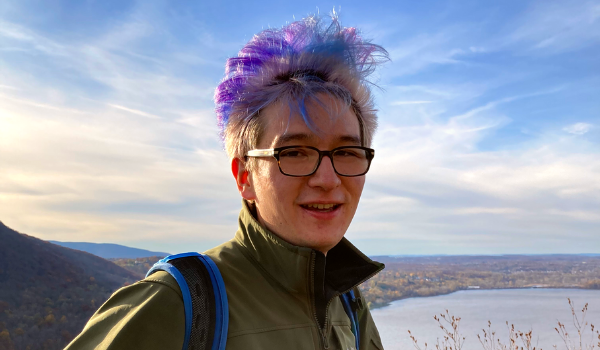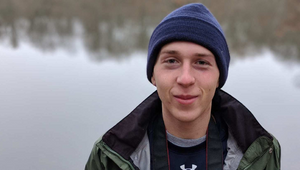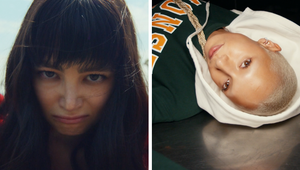
Other NYC’s Spencer Griswold on How VFX Takes Us Beyond Reality

When does an art become a science? In the highly-digitised and endlessly aesthetic world of visual effects, it’s an open question.
It’s helpful, then, when a VFX artist can blend together a passion and appreciation for both fields. That’s precisely what Other NYC’s Spencer Griswold does, taking skills acquired from a childhood love of biology and the natural world, and applying them in the artistic realm of visual effects. The result - so far - has been a career which began at NYU Tisch and has since included projects for some of the biggest clients one could imagine.
Excitingly, Spencer isn’t content to stop there. As the VFX artist tells LBB, he’s at his happiest when a client approaches with a seemingly impossible task - and, in this industry, the next one is always waiting just around the corner. To pick back over his career so far and break down the science and artistry behind jaw-dropping VFX, LBB sat down with Spencer…
LBB> Let’s start right at the beginning. How did you first know that a career in this industry would be the right one for you?
Spencer> It was really early on, when I was about 15 years old. Visual effects were becoming kind of trendy on YouTube, and I was always at least part way down a YouTube rabbit hole on the subject. One of the Youtubers I followed mentioned that he’d been to film school and from that moment onwards I knew what I wanted to do.
Before that, I thought I was looking to become a marine biologist. So while it felt like quite a revolutionary pivot for me at the time, I started making my own films, taught myself After Effects in about a day, and it all felt so natural. I’ve been really engaged learning new and complex software packages ever since!
So I’ve always been interested in this industry through the prism of effects, and that’s consistently been what inspired me because it’s an area where you feel as though you can truly make anything happen.
LBB> It’s interesting that you initially saw yourself as a scientist - do you see VFX as a science?
Spencer> To an extent I do, yeah. Particularly when it comes to working on invisible VFX, you have to understand the way a world works on a very visceral and scientific level before you can start manipulating it as an artist. That applies to working with lights, shadows, momentum, or anything that plays with the rules of a world the audience sees on-screen.
In that sense, great VFX is a lot like a magic trick. It’s not just the technical side that you need to be able to pull off, it’s also about physics and audience psychology. So, yes, a scientific approach to VFX is certainly advantageous.
LBB> So VFX is an art and a science at the same time?
Spencer> When it comes down to it, yes. Because if something doesn’t have an aesthetic appeal then it isn’t going to work, regardless of how technically impressive it might be. That’s why I think there’s a really wide spectrum of people in the VFX and graphics community. It ranges from people who are coming at it from a technical or scientific perspective, to those who would think of themselves more as an artist - or even as a digital painter.
LBB> And where are you on that spectrum?
Spencer> Ha, good question. I really like to see myself bridging the two extremes, or as someone who can bring an understanding of technical competence to a beautiful or creatively ambitious piece of work. I really push myself to straddle as much of the spectrum as possible.
I remember one of the films that really inspired me when I was younger was James Cameron’s Avatar. That blew my mind when it came out because it really gave this sense of a living, breathing world which felt fantastic and yet tangible at the same time. I feel like that’s a very pure encapsulation of the potential of VFX.
Above: James Cameron’s Avatar influenced a young Spencer Griswold by bringing to life a ‘living, breathing world’ through VFX technology.
LBB> I remember that Avatar's release also coincided with the launch of 3D in cinemas. As a VFX artist, how helpful do you find that technology in adding to an audience’s level of immersion?
Spencer> It’s a tough thing because it really can go either way. You have examples like Coraline where, because it was stop-motion animation, they could control the depth of the image on a frame-by-frame basis and they did some really interesting things with that. For example, they used it to convey the character’s sense of feeling confined or liberated in her two worlds. So that was really impressive and artistic.
On the other hand, it can be slapped on as a gimmick or through a sense of obligation. That’s always disappointing because there’s clearly potential in the technology.
LBB> Would you say that a sense of world-building is something that you find particularly rewarding about your work?
Spencer> Creative and technical problem-solving is really what I find rewarding, especially when the result has a strong impact on the emotional weight of a piece. So not necessarily world building, but that would certainly fall into this category.
What’s great is when a director comes to you with an ambitious problem to solve, and you make the solution happen. When your work is spectacular and visceral it’s always exciting, but it can be just as rewarding to figure out how to adjust the way an object looks or clean up an environment in a convincing way. I relish those kinds of technical challenges where you can bring an artistic vision to life.
There’s nothing worse than coming up with an idea, and then realising that it’s just not possible for whatever reason. I get the most satisfaction out of helping people who’ve encountered that feeling realise that actually, thanks to VFX, anything IS possible.
LBB> Looking back at your career so far, are there any projects which stand out as particularly significant creative milestones for you?
Spencer> The first big project that I worked on was as part of a ragtag company where we had to create a 90 degree CG animation which was projected on a massive 80 foot wide dome as part of the HP’s “The Lab” at the Panorama Music Festival. It was only six of us - myself and one other intern included - conceptualizing and animating a 12 minute short film for a non traditional screen, so that was a very exciting project filled with all sorts of challenges.
That was a really cool way to emerge from the realm of school and into something more tangible. Going to the festival, sitting under the dome and seeing all that work become a reality was a really impactful experience.
Above: A teaser film promoting 2017's The Ark, produced as part of HP's 'The Lab' in 2017
LBB> And have there been any projects which have shone for you recently?
Spencer> Yeah, absolutely. As I say, I love tackling ambitious creative ideas and a good example of that is our work with Circus Maximus. We had a project for a real estate company which involved bringing their app into real life using holograms to show off their user interface and functionality - while making it look incredibly cool, of course. This was the first project I’d really taken the lead on, so that was incredibly exciting and rewarding to see the results.
Another one I’d mention is that one of the founders here, David Johnston, has been directing videos for Monse, and I’ve been doing effects on those ads. Because he’s the director, we collectively had a bit more creative freedom and I’ve been doing some fun stuff. There was one particular film, for their Fall 2021 collection, which featured a shot inside a school, for example, where we changed the school flags and scoreboard in the gym. There was also one shot which featured an unlit cigarette and I got to go really deep into the physics of making a cigarette burn and getting it to feel as believable as possible. We then took it into the surreal where the smoke seeped out beyond the image’s frame - it was a mixture of something both hyper-realistic and beyond reality.
LBB> You must need to be incredibly mindful of details in order to bring shots like that to life. Do you find that you’re often looking out for these kinds of small details in your day-to-day life, and does that give you inspiration for your work?
Spencer> Absolutely, yes. When light shines off an object I’m taking a note of how it looks, how different materials take light, how many colors make up a blue sky, and what makes some fires feel more “angry” than others. There’s always something surprising that you might not necessarily expect to behave in the way it does. Maybe one of the great blessings and curses of being a VFX artist is always contemplating just how complicated reality is!
LBB> I’m starting to see a link between the work of a VFX artist and the observational skills one might need to be a marine biologist…
Spencer> Haha, I think you might be onto something! That’s not something I’d really noticed before. I figured that I was going as far away from the traditional sciences as it was possible to get when I applied to film school, but I can totally see your point. Perhaps the two careers aren’t as far apart from one another as I thought.
LBB> And on a final note, is there a particular kind of project that you’d be especially excited to work on in the near future?
Spencer> As I say, I really like it when a client comes to me with a unique and exciting vision which is also technically challenging. I like it when a visual effect is not just the same thing we’ve seen a million times before. There are only so many times you can see someone shoot fire out of their hands before it loses its sense of spectacle, you know? So really playing with the viewer’s psychology and manipulating their emotions in a way that you couldn’t necessarily achieve without VFX would be an inspiring challenge for me.
There was one project I’ll always remember where we had to bring to life an enormous weeping willow tree, which was also on fire. Working with the director and DP to figure out the lighting on set and imagining precisely how that type of tree would burn was a big challenge, and the result was totally unique. I’d love to do more like that, when I can really work with a team to develop a vision from pre-production through to post. That’s really exciting to me!










